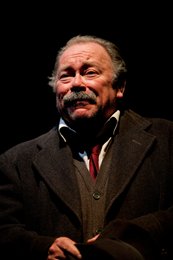Toby Frow’s smoothly-directed revival of what is arguably Leonard’s best play prompts questions about the precise focus of the work. Its surface is unashamedly entertaining, built on a foundation of vivid characterisation. Frow draws poignant performances from his cast - particularly from Owen Roe, as Tynan the gardener, the eponymous Da, full of the bluster and braggadocio of a servile, ignorant man; his portrayal of Tynan as the bewildered old widower is precise and tinged with pathos - and from Ingrid Craigie, as the little bitter sparrow of a Mother, trapped in an arranged marriage and saddled with the rearing of the illegitimate Charlie. When Roe and Craigie collide in domestic strife, the outcome is the most forceful scene of the evening. John Kavanagh’s Drumm is desiccated, pedantic, punctilious, and yet he draws out an ultimately ironic view of existence that makes one understand why Leonard was moved to pursue him further in another play, A Life. Stuart Graham and Tadhg Murphy, as the adult and younger versions of Charlie, are convincing as complementary sides of the one coin.
servile, ignorant man; his portrayal of Tynan as the bewildered old widower is precise and tinged with pathos - and from Ingrid Craigie, as the little bitter sparrow of a Mother, trapped in an arranged marriage and saddled with the rearing of the illegitimate Charlie. When Roe and Craigie collide in domestic strife, the outcome is the most forceful scene of the evening. John Kavanagh’s Drumm is desiccated, pedantic, punctilious, and yet he draws out an ultimately ironic view of existence that makes one understand why Leonard was moved to pursue him further in another play, A Life. Stuart Graham and Tadhg Murphy, as the adult and younger versions of Charlie, are convincing as complementary sides of the one coin.
Leonard knows how to craft the well-wrought play. He had laboured hard at adaptations for TV for over a decade and contributed on an almost annual basis to the Dublin Theatre Festival, before he wrote Da, so in terms of construction, he’s in a comfort zone: the story-line is clear, playing with times past and times present, with a split narrative (shades of Friel’s Philadelphia). The composition of the piece ebbs and flows, the final scenes cascading to a definitive curtain-fall. He peppers the dialogue, with a canny sense of timing, with robust - often vulgar - one-liners. He manages the nuances of class accents from the rough-hewn vernacular of Da (direct descendant of Captain Boyle) to the idiom of the faded Protestant land-owning caste (fine cameo by Deirdre Monaghan) and, somewhere in between, the aspirational enunciation of an emerging bourgeoisie. Frow’s work does justice to all of this.
The play is more than 35 years old so it’s easy to spot the dated elements – Sweet Afton, Dale Carnegie self-improvement, the Tivoli. The Dublin suburbs of the fifties are set in aspic. Set and costume by Ben Stones bear signs of meticulous research, evocative of the era of rationing, the whist drives, weekly trips to ‘the pitchers’, the splendour of the Royal Marine Hotel. The texture of the visual and verbal components recreates an era and will bring an older audience down memory lane.
.jpg.aspx%3Fwidth=260&height=173) But for all the evocation of the ‘rare oul’ times’, this is a bitter diatribe. Leonard pulls back from the edge of sentimentality because his narrator has a spine of ice through his being. His agony is that he is haunted by a Da he despises. He wants to shake off the mediocrity and the crass stupidity of his background. His adoptive parents are boorish and unattractive and they articulate their concern for their adopted child in the most ham-fisted manner. It’s a chronicle of humiliation - making the boy wear a patched-up shirt, proclaiming his 'bastardy', rebutting his attempts to repay them. It’s not clear who exactly we are watching (Is it Charlie Tynan? Hugh Leonard? Jack Keyes Byrne?) but the anger is palpable and in this he is abetted by Drumm as a mouthpiece for misogyny and chauvinism, an assertion of ‘standards’ that relies on a venomous loathing of most of humanity.
But for all the evocation of the ‘rare oul’ times’, this is a bitter diatribe. Leonard pulls back from the edge of sentimentality because his narrator has a spine of ice through his being. His agony is that he is haunted by a Da he despises. He wants to shake off the mediocrity and the crass stupidity of his background. His adoptive parents are boorish and unattractive and they articulate their concern for their adopted child in the most ham-fisted manner. It’s a chronicle of humiliation - making the boy wear a patched-up shirt, proclaiming his 'bastardy', rebutting his attempts to repay them. It’s not clear who exactly we are watching (Is it Charlie Tynan? Hugh Leonard? Jack Keyes Byrne?) but the anger is palpable and in this he is abetted by Drumm as a mouthpiece for misogyny and chauvinism, an assertion of ‘standards’ that relies on a venomous loathing of most of humanity.
The play gains its power from its capacity to chronicle the struggle of the young to break free. The older generation has its hooks into the young and although Charlie marries in Belgium, lives and works in London, and stays away from Dalkey, he is shackled to turmoil. The haunting leaves Leonard/Charlie with scarcely a vestige of affection – "Let me be! Get out of my head!" – and the viewer with a bitter after-taste. What gives the play its backbone is the fact that the author is willing to enter this emotional territory, even though both he and Frow are too ready to pull back into the safer zone of the hilarious.
Derek West